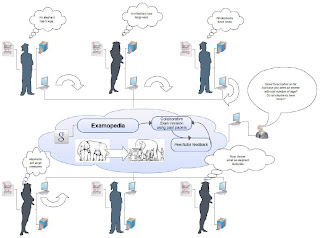Examopedia - A collaborative exam revision site that fosters student's informal ways of preparing for exams using past exam papers and helps them improve their solutions to past papers through critical feedback from the academic and peers. This site now lives in the Cloud which makes it an example of a cloud learning environment or
CLE.
Exam revision is isolating and stressful, blurred boundaries through the use of web 2.0 technologies (like wiki etc) is shown to have helped. Many student prepare using past exam papers, Examopedia helps form a community around this informal activity students engage with. Its also provided opportunity for academics to gauge student confidence prior to exams on different topics and deliver relevant 'Just-in-time' teaching and encourage deep learning via guidance and feedback given on the site.
The Past
For the past three years I have been using
Twiki for my Examopedia service that I run for my students. I have blogged about it
earlier. Students particularly did not like the wiki interface and its WYSIWYG editor, although better than most, is not perfect.
This work of mine is quite close to my heart as it has won me the
National Teaching Award from the Engineering Subject centre of the HEA as well as
University Learning and Teaching Fellowship. Here is a link to a
case study by Phil Barker written for the EngSC. Phil has also
blogged about the service and has done a wonderful job of explaining the full potential of Examopedia as a service to students and as an OER.
The Present
This blog post is a reflection about moving from an institutional system (using Twiki) to a Cloud Based service - Google Sites. You can visit the
new home of Examopedia that is on Google Sites on port.ac.uk domian. (This domain will die eventually and I will have to move it to another port based domain on the cloud).
It is for the first time in three years that I was able to create and share, the wiki pages involved in creating this year's Examopedia, with all students in my class. This meant that all students were invited to view the site via a link in their mail box sent by Google Sites during sharing the site with the students. It is the first time in three years that I could easily give access to all students as collaborators/editors. In the past students were required to create accounts on my Twiki site and only then could they edit the wiki pages. Now the account exists as they all have a google email address.
With Google Apps access to all students and Google mail accounts for all students, this worked like a trick. Better still, I was able to add Google Analytics to capture the
site usage and site behaviour. An amazing 3000+ page views in just 14 days of its operation - most of which from portsmouth (class size = 58+80=138 students).
The Future
I have said several times that I wanted to use Google Wave for the Examopedia but decided against that at this stage as Google Wave was accessible by a handful when I created and shared Google Sites with my students.
I think when and if Google Wave becomes part of the Google Apps deal for universities I may try it out as a platform for Examopedia. I think I will straighaway loose out on the analytics part if I did that. Besides I am observing a colleague Dr. Boris Gremont's tutorial wave, who kindly added me to this wave that does what Examopedia does for exam revision but on Google wave.
What do students make of examopedia?
It will not be wrong if I was to say that it is very successful in what it does and achieve. I surveyed a few students so far and the results are very positive. Its is not for everyone though, especially those who are very independent learners and like to revise all topics individually and practice exam questions individually. But even such student visit the site and read contributions from other students and my feedback/guidance to gain confidence.Forums are not the same as wikis and students can see the difference as in Examopedia students can conly contribute a solution. Communication between collaborators is muted on examopedia, but can go on in the forums if needed. All the contributions to a specific question are at one place as opposed to a forum which usually have a long thread of contributions and arguments too. Reading through these contributions can be confusing and time consuming.
One criticism I had this year was the amount of questions that were on Examopedia. Students said they wanted more questions to revise the entire syllabus. Clearly, they liked the revision service and wanted more of it. Another critiscim was that some of the answers were confusing. I usually provide guidance and feedback on conflicting and confusing answers. This view may have developed prior to me giving feedback but I need to investigate more. There were some access issues initially and for some time as the students first time used Google Sites and the fact that we had 2 domains (@myport and @port) did not help at all. That is why I said above that the @port domain will die eventually and we will have one domain.


